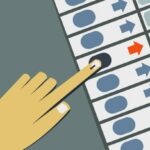WHY IN THE NEWS?
The Election Laws (Amendment) Act, 2021 amended the Representation of the People Act, 1950 and the Representation of the People Act, 1951 and it received the assent of the President on the 29th of December 2021.
EXISTING ELECTORAL LEGISLATIONS
- Constitution has not mentioned any specific provisions regarding the manner of conducting elections.
- The Constitution has delegated the power to Parliament to devise legislations for conducting free and fair elections.
- Consequently, Parliament has passed the legal frameworks called the Representation of the People Act, 1950, and the Representation of the People Act, 1951.
Representation of the People Act, 1950
The legislation has the following provisions:
- The act provides for the allocation of seats in the House of the People and in the Legislative Assemblies and Legislative Councils of States.
- It lays down procedures for the delimitation of constituencies.
- The act lays down the qualification of voters.
- It lays the procedure for the preparation of electoral rolls and the manner of filling seats.
Representation of the People Act, 1951
The legislation has the following provisions:
- This act deals with provisions like qualification and disqualification of members of both houses of Parliament and the state legislatures.
- It has provisions for the actual conduct of elections and by-elections.
- It also provides provisions to curb corrupt practices and other offenses.
- It provides the procedure for settling doubts and disputes arising out of elections.
- It provides administrative machinery for conducting elections.
NEED FOR NEW AMENDMENTS TO THE EXISTING LEGISLATIONS
- Curb Bogus votes
- In order to eliminate the menace of multiple enrolments of the same individual at different places for casting electoral votes.
- Free and fair electoral system
- To ensure that the electoral is free from malpractices and to conduct free and fair elections from local levels to Parliamentary elections.
- Constitutional Right
- Under Article 326 and 61 st Constitutional Amendment, provides the Right to vote once a person attains the age of 18 years.
- The electoral Laws amendment act 2021 was made to ensure enrolment of those who attain 18 years without delay and thereby enjoying their Constitutional Rights.
- Gender parity
- The recent amendment introduced changes to make the legislation gender neutral.
WHAT ARE THE RECENT CHANGES INTRODUCED THROUGH AMENDMENTS?
- Linking electoral roll data with Aadhaar
Existing provision
- The RPA 1950 Act provides that a person may apply to the electoral registration officer for the inclusion of their name in the electoral roll of a constituency.
- For that, the applicant has to submit an authenticated ID proof for verifying the age and address of the same.
- After verification, if the officer is satisfied that the applicant is entitled to registration, he will direct the applicant’s name to be included in the electoral roll.
Amendment
- The new amendment made a provision that the Electoral Registration Officer may require a person to furnish their Aadhaar number for establishing their identity. The main purpose of furnishing Aadhaar in this case is for identification.
- If that person is already existing in the electoral roll, then the Aadhaar number may be required for authentication of entries in the roll. Thus, the purpose of furnishing Aadhaar, in this case, is for authentication.
- However, persons will not be denied inclusion in the electoral roll or have their names deleted from the roll if they are unable to furnish Aadhaar Proof.
- So, the provision provides a choice for the applicant or it can be said that submitting Aadhaar is not mandatory.
- But there must be a sufficient cause as prescribed by the Union government for not furnishing the Aadhaar proof.
- Such persons may be permitted to furnish alternate documents prescribed by the central government.
Why is Aadhaar to be furnished?
- The Aadhaar proof is unique in nature. It has the details of the iris and fingerprints of that particular person.
- By using such proof, the government can eliminate unscrupulous activities to an extent.
- Qualifying date for enrolment in the electoral roll
Existing provisions
- Under the 1950 Act, the qualifying date for enrolment in the electoral roll is January 1 of the year in which such roll is being prepared or revised.
- This will result in a situation where a person who turns 18 after January can enroll in the electoral roll only when the roll is prepared/ revised the next year.
- Thus, a person getting 18 years in the month of March has to wait 9 months to avail their Constitutional Rights under Article 326- Right to vote.
Amendment
- The new amendment provides four qualifying dates in a calendar year, which will be January 1, April 1, July 1, and October 1.
- This will give an opportunity for all individuals who are turning 18 years for enrolment qualification without much delay.
- Gender-neutral provisions
Existing provisions
- Under RPA 1950 Act, certain persons who are ordinarily resident in a constituency can register on electoral rolls.
- Such persons include those holding a service qualification, such as members of the armed forces or central government employees posted outside India.
- The wife or wives of such persons are also deemed to be ordinarily residing in the same constituency if they reside with them.
- Thus, this act enables the wife of a person holding a service qualification to vote either in person or by postal ballot.
Amendment
- The new amendment replaces the term ‘wife’ with ‘spouse’ in both Acts.
- This particular amendment provision ensures greater gender parity at the electoral level.
CONCERNS WITH RECENT AMENDMENTS
- Lack of reliable statistics- The union government is not having clear-cut data on bogus and fraudulent votes taking place.
- Against Privacy
- The recent amendment of linking the electoral roll with Aadhaar would lead to infringement of the privacy of citizens.
- The Supreme Court stated under K.S. Puttaswamy v/s Union of India in 2017 that the Right to Privacy is protected as an intrinsic part under Article 21-Right to Life and Personal liberty
- In 2018, Supreme Court mandated that Aadhaar enrolment be used only for receiving government welfare benefits. It is basically to curb the leakages of subsidies provided to the needy ones.
- Absence of Data Protection Legislation
- The long pending Data Protection Bill in the parliament is a major cause of concern.
- Since Aadhaar contains crucial information related to a person such as iris and biometric information, the mere use of Aadhaar data cannot be allowed.
- There might be high chances of misuse of personal information without proper legislative frameworks.
- Absence of real choice
- Although linking Aadhaar is not mandatory, the reasons for not linking have to be aligned with the prescribed causes of the Union government.
- Against the Voting right.
- If a person is not interested in linking the enrolment data with Aadhaar, there might be some roadblocks and procedural constraints in case their reason was not aligned with prescribed causes.
- Previous rulings of the Supreme Court
- In 2015, the Election Commission of India started a pilot project of linking electoral rolls with Aadhaar. However, the Supreme Court has stopped the process on account of doubt about the credibility of Aadhaar. Moreover, there were no Privacy related measures since the Puttaswamy case has not been passed during the said period.
- In 2017, a nine bench of the Supreme court in justice ‘K.S. Puttaswamy vs Union of India’ held that privacy is a natural right and it is an intrinsic part of the Right to life and liberty under Article 21. Therefore, linking the electoral roll with Aadhaar tend to violate the fundamental right “Right to Privacy”.
GOVERNMENT’S STAND
- The recent amendments are made to ensure a free and fair election in letter and spirit.
- To curb bogus votes and to make representative democracy without any fraudulent activities.
- There is no need to misinterpret Supreme Court’s judgment.
- There is a voluntary choice for the citizens in linking electoral roll data with Aadhaar. It is not a mandatory provision.
DOES THE ELECTORAL PROCESS COMPLETELY BE CLEANED WITH THIS AMENDMENT?
- Case of multiple Aadhaar
- As per the Unique Identification Authority of India (UIDAI), the chances of multiple Aadhaar cards are not possible. But there is a clause of prosecution if a person holds multiple Aadhaar cards.
- It is because of the disruptive technologies, that there are chances that it can be tampered with and can have multiple Aadhaar cards.
- In 2020, the Gujarat High Court ordered in a case to find the original card where a person holding two Aadhaar cards at the same time.
- Multiple votes
- There are chances that a person can have votes at different places if the election is not conducted simultaneously.
- For example, a person registered in the Urban area often comes to cast vote in the rural election. It is because the political parties are practicing politics without ethics and register the name of people in urban areas under the rural electoral list. Since the election is taking place not on the same date, the original urban folks would again register their names under the urban electoral list.
- The same incident happens in the case of council elections also.
- So, the question here is does the Aadhaar linking solve this problem?
- Manipulation can happen since elections are taking place with some gaps between the localities. For this concern, the need is to invest in infrastructural facilities to conduct elections simultaneously or with reduced gaps.
- Address mismatch
- Due to globalization, urbanization, and technological growth, people are changing their workplace, so the address also.
- The frequent changing of the address will make an issue while linking the electoral roll data with Aadhaar.
- Vote by another person on behalf of a voter
- Aadhaar linking cannot solve if a person votes on behalf of the real voter.
- Booth capturing and illegal voting can be eliminated only when the Electoral officer is not manipulated.
- Deleting data of the deceased person
- Municipalities or Gram panchayats while issuing the death certificate must send the information to the Electoral Registration Officer to remove the names of deceased ones.
- Linking of Aadhaar is not having any particular advantage in this case.
- Other menaces- many issues are still existing. The recent amendments cannot clean the process completely.
- Criminalisation of politics
- Communalisation of Electoral rolls.
- Money, Muscle, and Mafia power
- Political corruption
- Caste-based politics
- Vote bank politics
WAYFORWARD
- Regular facility
- Create a facility to regularly verify electoral rolls to identify if there are missing names of voters.
- Verifying electoral rolls prior to one week may not be able to change or add names to electoral rolls. Updating with a regular interval of time ensures no missing of votes.
- Infrastructural developments
- Infrastructure in terms of human capital such as working staff, electronic voting machines, buildings, etc. needs to be improved.
- It may help in conducting elections simultaneously. Thus, it helps in eliminating multiple votes for the same person at different places.
- Data Protection Act
- Proper measures to be taken to enact the Data Protection Act so as to bring the confidence of the public.
CONCLUSION
It is necessary to make comprehensive legislation to make the election system more credible. The recent amendments are made with good intentions but are not sufficient to clean the entire electoral process. The Constitutional validity of the amendment itself is questioned and it is the honourable Supreme Court to decide the Constitutionality of the same.
PRACTICE QUESTION
Do you think that bogus voters are a serious challenge to the Indian electoral system? Critically explain how the recent amendment to the law to link voter ID with Aadhar solves the problem.(250 Words,15 Marks)


